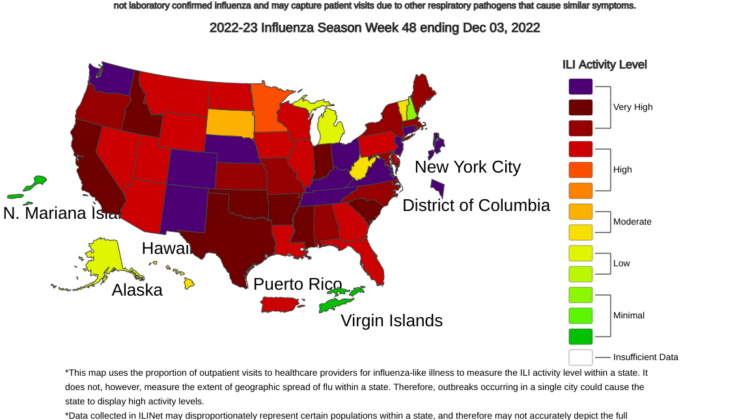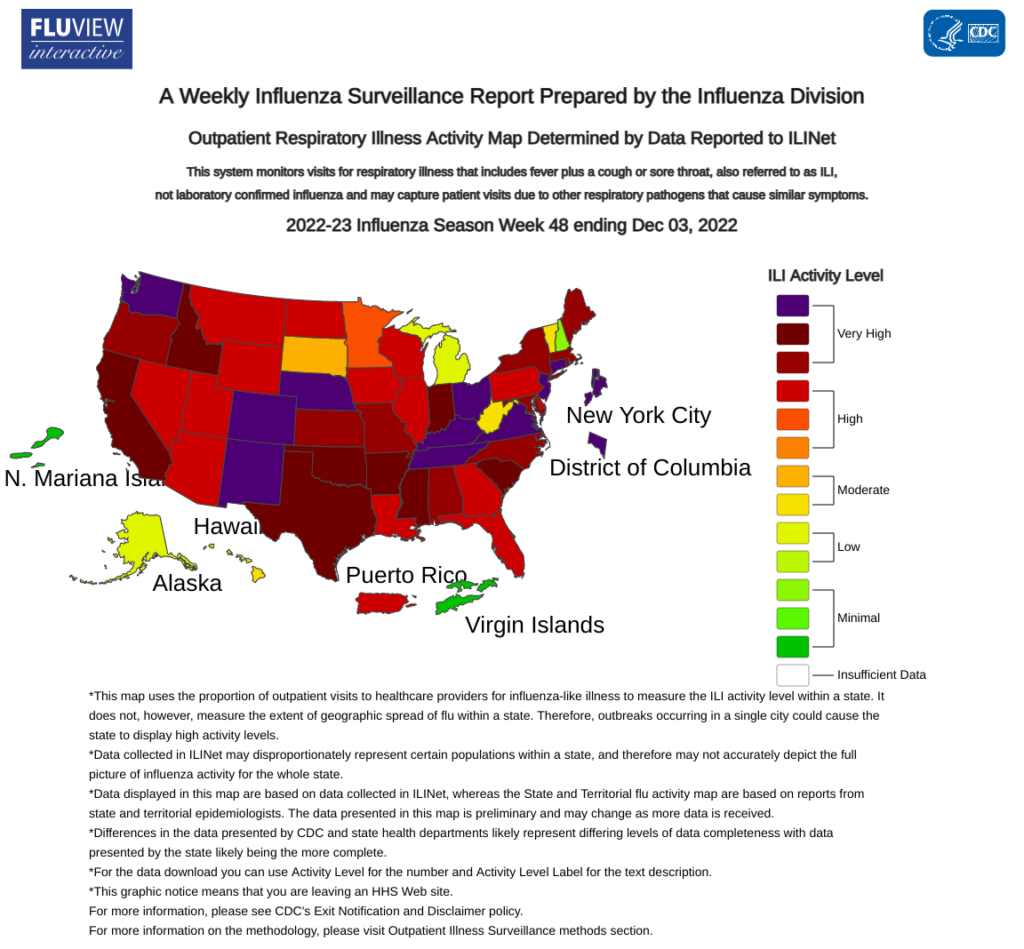
 Flu cases across Tennessee continue to rise in numbers. The Centers for Disease Control reported the percentage of patients visiting sentinel clinics in Tennessee with respiratory and flu-like illnesses was 11.9 percent last week. The CDC baseline is 3.1 percent. Tennessee joined Kentucky, Ohio, Washington, District of Columbia, New York, New Jersey, Connecticut, New Mexico, Colorado and Nebraska with the highest number of cases of flu-type illnesses in the United States.
Flu cases across Tennessee continue to rise in numbers. The Centers for Disease Control reported the percentage of patients visiting sentinel clinics in Tennessee with respiratory and flu-like illnesses was 11.9 percent last week. The CDC baseline is 3.1 percent. Tennessee joined Kentucky, Ohio, Washington, District of Columbia, New York, New Jersey, Connecticut, New Mexico, Colorado and Nebraska with the highest number of cases of flu-type illnesses in the United States.
 With the number of flu cases continuing to rise, medical director of infectious disease for Baptist Memorial Health Care Dr. Steve Threlkeld confirmed clinics are also seeing a rise in positive COVID-19 cases.
With the number of flu cases continuing to rise, medical director of infectious disease for Baptist Memorial Health Care Dr. Steve Threlkeld confirmed clinics are also seeing a rise in positive COVID-19 cases.
“It’s very much on the rise again, both nationally and more locally. COVID-19 positive patients in our hospital have tripled to 36 over the last couple of weeks. Thankfully, not as many people are critically ill, though. People do still die and become very ill from COVID-19, but they are almost all people with significant underlying medical problems or people who were unvaccinated,” Threlkeld shared.
He said the current strain circulating shows there isn’t much of a difference in terms of symptoms, although the “classic loss of taste and smell is much less common.” Medical professionals are seeing a resistance to antibodies used to treat COVID patients and as a result, the monoclonal antibody has been removed from availability.
“We hope that this is not just another step along the path toward resistance to medications, vaccine-generated immunity, etc.,” Dr. Threlkeld noted.
Threlkeld noted the number of rising flu cases are the highest he has seen in longer than a decade. He also offered some advice regarding the influenza vaccines. Most all positive flu cases are showing as influenza type A.
“The good news is that the current vaccine seems on first examination to be a very good match for this year’s flu. It varies from year to year, as the vaccine by nature has to be a prediction of what the virus will look like months later. The vaccine is essentially always much more effective at preventing severe illness and death as well. An important point to remember is that if you are one of the many unlucky ones to get flu early this year, the vaccine has four different strains represented in it, and you should still get the vaccine to protect yourself from one of the influenza B strains or others that could circulate widely later in the winter,” Threlkeld said.
The medical community is not only dealing with a rising number of influenza and COVID-19 cases, a number of respiratory viruses are prevalent among patients.
“One of the big problems is that essentially all of the respiratory viruses have come roaring back this winter, because all of those behaviors we were practicing to prevent COVID-19 are even much more effective at preventing the less contagious viruses. So we’re seeing rhinovirus, adenovirus and respiratory syncytial virus, among others. RSV usually peaks later in the winter, and can cause relatively severe symptoms of wheezing and airway difficulties in the very young,” Threlkeld noted.
RSV has been the cause of many hospitalizations as elderly patients are also at risk for severe RSV. With all of these viruses circulating, Threlkeld said there is a concern for strained health care systems, especially in areas where there are fewer numbers of hospital beds and facilities.
As the holiday season approaches and families are making plans for Christmas get-togethers, Dr. Threlkeld shared some advice for keeping healthy during the holidays.
“Unfortunately, much of the same advice still applies, but people have become very tired of it. Around holiday family gatherings, testing should be a very important strategic plan to make sure that those at the gathering are home-test negative and, thus, not likely contagious. Particularly when your gatherings involve elderly relatives or people with significant medical conditions, testing may be critical.
“Also, handwashing is becoming even more important again. COVID-19 did not seem to be quite as transmissible by touch, but it is well known that many of the other respiratory viruses can be avoided by good hand hygiene. Good ventilation in meeting areas can still be a big help too. And above all, avoid close contact with people at high risk if you are experiencing a respiratory infection yourself,” Threlkeld concluded.






Leave a Reply